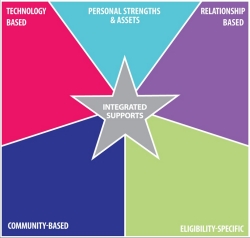Parenthood and raising a family can bring many joys and great memories. At the same time, we all know there are financial and emotional realities that come with any child, including children with disabilities. Caring for children with intellectual or developmental disabilities (i.e., cerebral palsy, autism spectrum disorders, spina bifida, Down syndrome, traumatic brain injury, etc.), or special healthcare needs can be challenging, confusing and stressful at times.
Research shows that parents of children with developmental disabilities experience higher levels of chronic stress, anxiety and depression than parents of children without disabilities. Seeking support for yourself as a parent or caregiver can help maximize your own strength, capability and capacity for caring for your child with a disability.
Many times, when we hear the word “support,” our minds go straight to formal programs or services that are specifically for our family member with the disability. However, families and caregivers also need support to help them in their roles as parents and providers of care. In addition to the services that help with day-to-day needs, individuals with disabilities and their families also need information to help guide their decisions and assist them in finding emotional support sources to provide comfort and assurance that they are not alone.
Parents can find emotional and informational support through connecting with and learning from other parents who have children with disabilities, through organizations that serve families of people with disabilities, and through many other avenues in their local community.
Different types of support might include:
- In-person support groups for parents of children with disabilities
- Parent groups online or via social media
- Peer mentoring, or one-on-one emotional support provided by another parent of a child with a disability
- Respite care
- Building skills to be better prepared for advocating for your child
- Faith communities
- Therapy or counseling
- Therapy or counseling
Learn more on how to strategize about the types of support you or your family member might need and where to find them using the Integrated Supports Star.
There are many general disability organizations throughout the state, like The Arc of Tennessee, as well as regional or statewide disability-specific organizations devoted to autism, Down syndrome, traumatic brain injury, etc. These groups help link parents to support options within their community and to other families in similar situations.Reaching out to others when you need help and taking care of yourself are crucial ways to ensure you are the best parent or caregiver you can be for your child with a disability.
TN Disability Pathfinder is a statewide information source for resources for parents, family members and caregivers.
There are two ways to search for support options or resources through Pathfinder:
- Browse the general resource library
- Search the online database of TN organizations and programs. You can search for support sources by using any of the following search terms (under “specific” search or “broad” search) and selecting your region or county of the state:
-
- Respite care services
- Support groups
- Mental health care and counseling
- Advocacy
- Support for families
Tennessee organizations or programs that can provide support for parents:
- TN Respite Coalition – Connects caregivers to respite resources.
- Parent-to-Parent initiative – Serve as a mentor or be matched with a parent mentor who has a child with disabilities.
- Step TN (Support and Training for Exceptional Parents) – Helps parents work with their child’s school to achieve their education goals and plans, as well as resolve conflicts or issues.
- Partners in Policymaking Leadership Training – Trains family members and adults with disabilities in advocacy and leadership skills.
- Family Support Program – The TN Department of Intellectual and Developmental Disabilities provides small amounts of financial assistance to eligible families of individuals with intellectual or developmental disabilities for needs like respite, home modifications, homemaker services, counseling, etc. Learn more and find a location near you.
Resources and Contacts
To learn more about the support available to parents or caregivers of children and youth with intellectual disabilities, developmental disabilities or special healthcare needs, visit or contact TN Disability Pathfinder.
Email: tnpathfinder@vumc.org
Helpline: 1-800-640-4636
Spanish and interpreter services for all other languages: 615-875-5083
